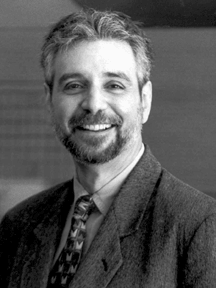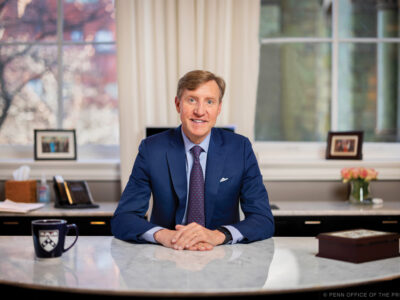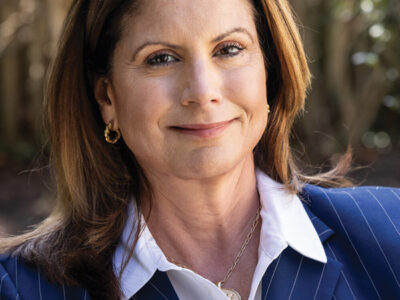
The University has selected a new Walter H. Annenberg Dean of the Annenberg School for Communication: Dr. Michael Delli Carpini C’75 G’75, a political scientist by training who most recently served as director of the public-policy program of the Philadelphia-based Pew Charitable Trusts. [See the interview with him below.] He replaces Dr. Kathleen Hall Jamieson, who stepped down at the end of last month after 14 years at the helm.
Delli Carpini’s scholarship in the field of American politics, public-opinion research, and mass media provides a certain continuity for the school, given Jamieson’s own high-profile scholarship and commentaries in—and sometimes on—the news media. His four books include What Americans Know About Politics and Why It Matters and Stability and Change in American Politics: The Coming of Age of the Generation of the 1960s, and he has written dozens of journal articles, essays, and panel papers. Before joining Pew in 1999, Delli Carpini served as a member of the graduate faculty of Columbia University, as professor and chair of political science at Barnard College, and as assistant professor of political science at Rutgers University. He earned his bachelor’s degree in English and his master’s degree in political science at Penn in 1975, and received his Ph.D. in political science from the University of Minnesota in 1980.
According to Penn President Judith Rodin, Delli Carpini’s “impressive record of accomplishments in both the academic and public-policy arenas will serve the school well as we build it into an ever-stronger institution.”
Rodin and Provost Robert Barchi Gr’72 M’72 GM’73 also expressed their “enormous gratitude to Kathleen for the dedication and guidance she has provided to the Annenberg School.” During Jamieson’s tenure as dean, the school received $350 million in endowments from the late Hon. Walter H. Annenberg W’31 Hon’66 and his wife, the Hon. Leonore Annenberg Hon’85. The Annenberg family’s support for the school “demonstrated over and over again their appreciation for the role the mass media plays in our society,” Rodin and Barchi noted.
It also demonstrated their respect for Jamieson, who will take a “well-deserved sabbatical year” (in Rodin and Barchi’s words) as a fellow of the Center for Advanced Studies in the Behavioral Sciences at Stanford University before returning to directing the Annenberg Public Policy Center (APPC), which she has headed since its founding in 1993.
One of the APPC projects on which she will be working—along with Leonore Annenberg and the Annenberg family—is the creation of programming for the Annenberg Foundation Trust at Sunnylands, the family’s estate in Rancho Mirage, California. “With $20 million in projected funding over the next three years, we are developing reference books on the institutions of democracy, to be published by Oxford University Press, as well as high-school learning materials on those institutions,” Jamieson told the Gazette.
“We have also convened seven commissions to synthesize what is known about the diagnosis and treatment of adolescent mental disorders (mood disorders, anxiety disorders, eating disorders, schizophrenia, drug and alcohol abuse, suicide, and ways in which positive youth development might interdict them),” she added. Those commissions will meet at Sunnylands next January, and will produce a reference book and “learning materials for teens and their families.”
Jamieson enjoyed a warm relationship with the Annenberg family, and she said that the most memorable event during her deanship was the 1999 gala that jointly celebrated the 40th anniversary of the school’s founding and the Annenbergs’ wedding anniversary. “It was the last time that Ambassador Annenberg was at the school,” she added, noting that a “picture of the evening” hangs in her new office.
Another prominent, long-time member of the Annenberg faculty —Dr. Larry Gross, professor of communication—will also be leaving Penn to become director of the other Annenberg School for Communication: the one at the University of Southern California.
“I could stay here,” said Gross, who was the lone inside candidate for the deanship at Penn’s Annenberg School at the same time that he was being courted by USC. “I like Penn; I like my colleagues; but if I was going to do something different, this would be the time to do it. The opportunities at Annenberg West, as we call it, are very attractive. So it seemed like the right thing at the right time.
“I’ve been here long enough to watch and participate in the growth of the school from its initial stages to its maturity,” added Gross, who taught at “Annenberg East” for 35 years. “I think it’s a great place. It has a very strong, well-deserved reputation, and an impact in many fields that belies its relatively small size. And by going where I’m going, I could still, when asked, say I’m at the Annenberg School.”
The New Dean Communicates
Several weeks after he was chosen as the new Walter H. Annenberg Dean of the Annenberg School for Communication, Dr. Michael Delli Carpini C’75 G’75 took part in an e-mail interview with Gazette senior editor Samuel Hughes.
Gazette: What was your reaction to being chosen?
Delli Carpini: I was thrilled at a number of levels. I received my B.A. and M.A. from Penn in the 1970s, and the University played an incredibly important role in my personal and professional development. Coming back as a dean and member of the faculty is a dream come true. Plus, Annenberg is one of the nation’s top communications schools and it’s an honor to be selected to lead it. And my wife, Jane, and I are big Philadelphia boosters, so we are glad to know we will be staying in the city.
Gazette: What is your assessment of the school at this point?
Delli Carpini: As I mentioned, Annenberg is one of the nation’s top schools of communication, with a world-class faculty in political communications, health communications, and cultural communications and theory. It also boasts a great Ph.D. program and really talented graduate students. And, through the school’s Public Policy Center, Annenberg has been in the forefront of applied research in a number of important policy areas related to communications.
Gazette: I realize that you haven’t even started yet, but would you care to talk about your short-term and long-term goals?
Delli Carpini: Answering this in any definitive way is tough, since I first really want to spend some time at the school and get to know the culture better. I also believe that whatever direction we move in over time, it must emerge as much from the Annenberg faculty as from me.
That said, first and foremost my goal is to maintain the quality and reputation of the school that has developed under the great leadership of George Gerbner and, over the last 14 years, Kathleen Hall Jamieson. This includes a strong commitment to the three areas the school has built strength in—political communications, health communications, and cultural communications and theory.
Beyond this, there are some hiring issues to consider. Larry Gross, who was an important and valued member of the faculty, has left to become director of the University of Southern California’s Annenberg School for Communication. This leaves a void in cultural studies that needs to be filled. In addition, I think we will have the opportunity to increase the size of the faculty modestly over the next few years. In doing so, my hope is that we can continue to build on strength, while also taking into consideration the University’s larger commitment to international issues, urban issues, and issues of new technology. I also plan to do my best to build more interdisciplinary connections to other schools, programs, and departments at Penn.
Gazette: What do you bring to the table?
Delli Carpini: Several things, I hope. My research focuses on the impact of media on civic engagement and democratic practice. As a result I think I bring some strength to the nationally recognized political-communications work already taking place at Annenberg. The fact that I’m trained as a political scientist connects me well to the interdisciplinary roots of the communications field. My work runs the gamut from quantitative to qualitative research, so I’m comfortable with and supportive of the range of methods used in the field. Some of my more recent research fits as well in cultural studies as political communications, so I can see the value of and connections between what are generally viewed as separate sub-fields. I love teaching and mentoring both graduates and undergraduates. And I have a fair amount of academic administrative experience, having chaired the political-science department of Barnard College at Columbia University for five years, and having helped start a Ph.D. program in communications at Columbia University.
Gazette: How does your Pew experience fit into the mix?
Delli Carpini: At Pew I directed the Public Policy Program, which supports various efforts to strengthen democratic life in the United States. That experience has broadened my thinking and skills in three ways. First and most practically, I learned a lot about the nuts and bolts of administration, managing a staff and budget, and so forth. Second, it gave me a greater appreciation of the ways in which good academic theory and research can and should play a role in “real world” considerations of public policy and democratic practice. And third, it gave me a great perspective on the importance of communications, broadly defined, to almost every aspect of democratic politics and community.
Gazette: Is it a coincidence that you’re in same field as Jamieson?
Delli Carpini: Yes and no. Given Annenberg’s strength in political communications, it makes sense to build on it to a degree. On the other hand, I know that the search committee was looking at possible candidates from a variety of sub-fields. One thing people should not take away from my being hired is that this means we are or will become a school that only focuses on political communications. The communications field is very diverse, substantively and methodologically—that is one of its strengths—and I intend to be as supportive of other areas of research and teaching going on at Annenberg as I am of political communications.
Gazette: The school is very well-endowed but has very few students—it eliminated its master’s program, and now has only a small number of Ph.D. candidates. Any thoughts on that?
Delli Carpini: It doesn’t make sense to grow for its own sake, and while small, Annenberg has done a great job in teaching undergraduates, training Ph.D.s, and having an impact on the field through its scholarly and applied research. That said, I certainly want to learn more about the decision to close down the M.A. program and the reasoning behind it. I am also open to additional ways that the school might meet its three-part mission of teaching, research, and service to the University and larger community. This might mean adding additional degree-granting programs at some point, but could also mean other, less formal approaches. The key is being sure we are filling a real need, and that we have the expertise and resources to do a first-class job.




